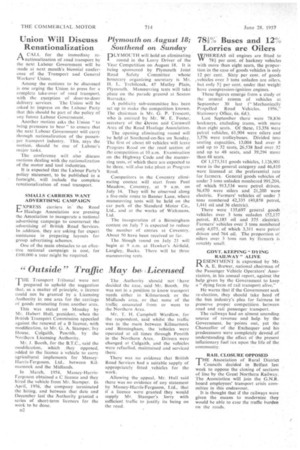781% Buses and 12% Lorries are Oilers
Page 50

If you've noticed an error in this article please click here to report it so we can fix it.
WHEREAS oil engines are fitted to 781 per cent. of hackney vehicles with more than eight seats, the proportion in the case of goods vehicles is only 12 per cent. Sixty per cent, of goods .vehicles over 3 tons unladen are oilers,
but only per cent, under that weight have compression-ignition engines.
These figures emerge from a study ot the annual census of vehicles at September 30 last (" Mechanically Propelled Road Vehicles, 1956,Stationery Office, 6s. 6d.).
Last September there were 78,836 hackneys, excluding trams, with more than eight seats. Of these, 13,356 were petrol vehicles, 61,904 were oilers and 3,576 were trolleybuses. Divided into seating capacities, 13,004 had over 8 and up to 32 Seats, 26,538 had over :32 and up to 48 seats, and 39,294 more than 48 seats.
Of 1,173,311 goods vehicles, 1,126,901 were in the general category and 46,410 were licensed at the preferential rate for farmers. General goods vehicles of under 3 tons unladen numbered 991,204, of which 913,534 were petrol driven. 56,470 were oilers and 21,200 were electric. Farmers' Vehicles of under 3 tons numbered 42,335 (40,858 petrol, 1,441 oil and 36 electric).
There were 135,697 general goods vehicles over 3 tons unladen (52,137 petrol, 83,185 oil and 375 electric). Farmers' vehicles over 3 tons numbered only 4,075, of which 3,311 were petrol driven and 764 oil. The proportion of oilers over 3 tons run by farmer's is notably small.
GOVT. KEEPING "DYING RAILWAY" ALIVE ,
RESENTMENT is expressed by Mr. IX A. E. Brewer, national .chairman of the Passenger Vehicle Operators' Association, in his annual report, against the help given by the Government to keep
" dying form of rail transport alive."
He warns that if the Government seek re-election, they should take heed of the bus industry's plea for fairness to preserve proper competition, between road and rail passenger transport.
The railways had an almost unending source of revenue and help by the Government, he -points out, yet the Chancellor of the Exchequer and his predecessors were completely devoid of understanding the effect of the present inflationary fuel tax upon the life of the community.
RAIL CLOSURE OPPOSED
THE Association of Rural District Councils decided in Belfast last week to oppose the closing of sections of line by the Great Northern Railway. The Association will join the G.N.R. board employees' transport crisis com
mittee in this endeavour. .
It is thought that if the railways were given the means to modernize they would be able to ease the traffic burden on the roads.








































































































































